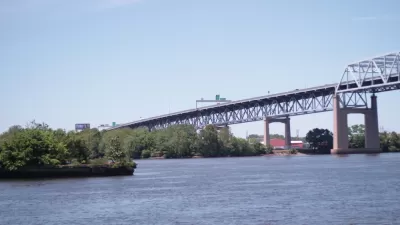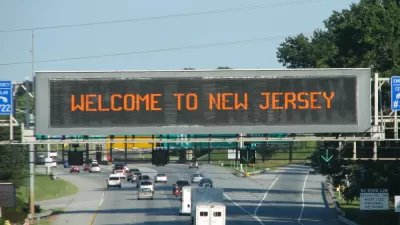The plight of laid-off laborers who had been repaving a New Jersey bridge illustrates that people suffer as well as infrastructure and mobility when transportation funding bills fail to pass.

Due to a 'state of emergency' declared June 30 by Gov. Chris Christie that shut down most state-funded road projects, the Garden State may be suffering more than any other state in terms of its ability to keep roads in good repair. But it's not just the roads that are suffering.
"The workers have been laid off since July 8, when Governor Christie ordered most state-financed construction projects to close because the Transportation Trust Fund is broke," reports Christopher Maag for The Record. "When Christie issued his executive order [PDF], he told the New Jersey Department of Transportation to expect the closure to last at least seven days."
Then, last week, State Senate President Steve Sweeney told the editorial board at The Record that he didn’t expect a fix until after the November election.
Labor unions are organizing the protests. The American Road & Transportation Builders Association is also protesting the shutdown. Both groups see the solution as increasing the gas tax. According to the ARTBA analysis [PDF], 1,700 construction workers will be displaced by the shutdown. "Over time, the reduction in [labor] demand could impact an additional 1,500 non-construction jobs."
Political impasse
As posted earlier, Gov. Christie wants the 23-cents gas tax increase to be accompanied by a one cent reduction in the state sales tax, which "blows a $2 billion hole in the budget," stated Sen. Raymond Lesniak (D-Union).
The Senate agreed to a tax reduction package costing $870 million. Both are examples of tax shifts, which theoretically shouldn't be required to increase the gas tax, particularly in New Jersey, which has the second lowest rate (14.5-cents per gallon) in the country, and hasn't been increased since 1988.
New Jersey Transportation Fund is dead broke
"Today the trust fund owes $30 billion in principal and interest, according to the Transportation Trust Fund Authority, which runs it," reports Maag. "Making payments on that debt now consumes every penny of revenue from the gas tax and other fees, making it impossible to finance new construction projects." [See "Road to Repair"].
The problem, transportation expert Martin E. Robins said, is that elected officials of both parties tried to meet voters’ conflicting demands. On one hand, everybody wants a safe transportation network that is well-maintained and gridlock-free. Few people want to pay for it, however. Polls by the Eagleton Institute of Politics at Rutgers University over the last year and a half show a solid majority of New Jersey residents oppose a gas tax increase.
Maag writes the fund "has been in crisis since at least 2003." Robins, "founding director of the Alan M. Voorhees Transportation Center at Rutgers University," gives a detailed explanation of all that went wrong with the trust fund over the terms of several governors. He "first warned of the looming crisis in a report published in June 2000."
Hat tip to The AASHTO Daily Transportation Update
FULL STORY: Construction workers protesting stalemate on N.J. transportation funding

Planetizen Federal Action Tracker
A weekly monitor of how Trump’s orders and actions are impacting planners and planning in America.

Maui's Vacation Rental Debate Turns Ugly
Verbal attacks, misinformation campaigns and fistfights plague a high-stakes debate to convert thousands of vacation rentals into long-term housing.

Restaurant Patios Were a Pandemic Win — Why Were They so Hard to Keep?
Social distancing requirements and changes in travel patterns prompted cities to pilot new uses for street and sidewalk space. Then it got complicated.

In California Battle of Housing vs. Environment, Housing Just Won
A new state law significantly limits the power of CEQA, an environmental review law that served as a powerful tool for blocking new development.

Boulder Eliminates Parking Minimums Citywide
Officials estimate the cost of building a single underground parking space at up to $100,000.

Orange County, Florida Adopts Largest US “Sprawl Repair” Code
The ‘Orange Code’ seeks to rectify decades of sprawl-inducing, car-oriented development.
Urban Design for Planners 1: Software Tools
This six-course series explores essential urban design concepts using open source software and equips planners with the tools they need to participate fully in the urban design process.
Planning for Universal Design
Learn the tools for implementing Universal Design in planning regulations.
Heyer Gruel & Associates PA
JM Goldson LLC
Custer County Colorado
City of Camden Redevelopment Agency
City of Astoria
Transportation Research & Education Center (TREC) at Portland State University
Jefferson Parish Government
Camden Redevelopment Agency
City of Claremont



























